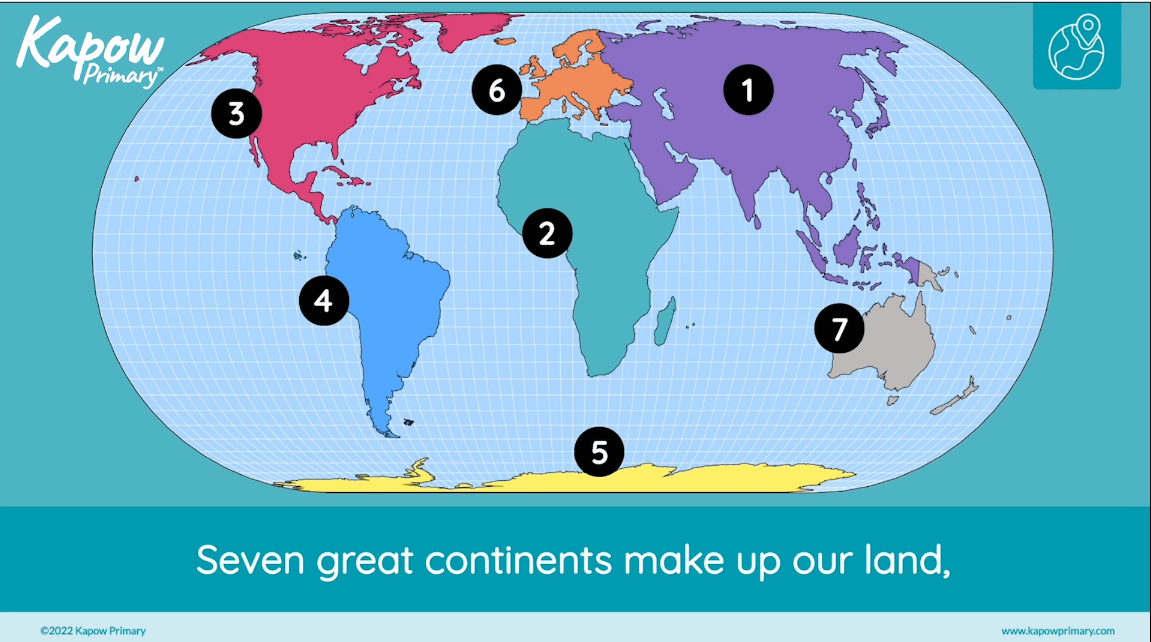
This Geography video introduces pupils to the seven continents through a fun and easy-to-follow song. With catchy lyrics and simple repetition, it helps pupils learn to name and identify the continents, while also developing an early understanding of their relative sizes and locations. The video encourages active participation and is ideal for embedding geographical vocabulary in an engaging way.
This video is part of Kapow Primary’s Geography Key stage 1 and Mixed-age resources. It supports pupils in developing locational knowledge and global awareness through music and movement.
-
Geography, Key stage 1, Year 1, What is it like to live in Shanghai?, Lesson 3: Where in the world is China?
-
Geography, Key stage 1, Year 2, Would you prefer to live in a hot or cold place?, Lesson 1: Where are the continents?
-
Geography, Mixed-age, Y5/6 (A): Would you like to live in the desert?, Y5/6 (A): Lesson 2: Where are deserts located?

This Geography video helps pupils memorise and understand compass directions through a catchy and energetic song. Using repetition and movement, the video reinforces the key directional terms — north, east, south, and west — as well as the combinations of northeast and southwest. It supports pupils in building early locational skills and spatial awareness in an engaging and accessible way.
This video is part of Kapow Primary’s Geography Key stage 1 resources. It provides a musical and kinaesthetic approach to embedding fundamental geographical vocabulary and concepts in Year 1.

This resource is a printable template to support our ‘The Big Draw: A Month Of Art Activities‘.


A visual summary from our Year 1 RSE & PSHE scheme of work, covering key concepts, knowledge, and vocabulary from the Economic wellbeing unit to support pupils’ understanding.

This RSE & PSHE teacher video supports the delivery of Lesson 6: Can anyone be anything? from the Year 3 Economic wellbeing unit. It provides guidance on how to sensitively explore gender stereotypes related to job roles and how they can impact children’s aspirations and self-esteem. The video also offers strategies for encouraging respectful discussion and challenging assumptions in a safe and inclusive classroom environment.
This video is part of Kapow Primary’s RSE & PSHE Lower key stage 2 teacher skills resources. It equips teachers to lead meaningful conversations around identity, diversity, and equality while helping pupils understand the importance of following their passions and skills when considering careers.

This webinar is hosted by our primary Science specialists, Leone Webster, George Simmonds and Romaine Butler.
They cover:
- The progression of knowledge, skills and vocabulary in Science
- How scientific enquiry, especially the enquiry cycle, is embedded throughout all of our units
- How the skills for working scientifically are integrated into the lesson
- An overview of the strands, key areas and Kapow Primary’s Science scheme of work
Hosted by our subject specialists, Jayne Galvin, Laura Driscoll and Zoe Higgins.
This webinar covers:
- Religion & Worldviews in the classroom: how to develop a Worldviews approach
- How to implement more diversity in your Religion & Worldviews curriculum
- The big questions to be addressed in a Religion & Worldviews curriculum
- The difference between substantive, disciplinary and personal knowledge in Religion& Worldviews
- An overview of Kapow Primary’s Religion & Worldviews scheme

Discover some of the behaviours children with different attachment styles display and why.
This video is part of the original Wellbeing scheme. Explore the revised Wellbeing scheme.







